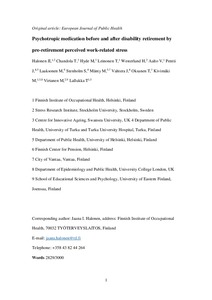Psychotropic medication before and after disability retirement by pre-retirement perceived work-related stress
Chandola T.; Mänty M.; Kivimäki M.; Laaksonen M.; Halonen J.I.; Stenholm S.; Westerlund H.; Lallukka T.; Leinonen T.; Aalto V.; Hyde M.; Vahtera J.; Virtanen M.; Oksanen T.; Pentti J.
Psychotropic medication before and after disability retirement by pre-retirement perceived work-related stress
Chandola T.
Mänty M.
Kivimäki M.
Laaksonen M.
Halonen J.I.
Stenholm S.
Westerlund H.
Lallukka T.
Leinonen T.
Aalto V.
Hyde M.
Vahtera J.
Virtanen M.
Oksanen T.
Pentti J.
Julkaisun pysyvä osoite on:
https://urn.fi/URN:NBN:fi-fe2021042823321
https://urn.fi/URN:NBN:fi-fe2021042823321
Tiivistelmä
Register-based date and diagnosis of disability retirement of 2766 participants of the Finnish Public Sector study cohort were linked to survey data on ERI, social- and health-related covariates, and to national records on prescribed reimbursed psychotropic medication, measured as defined daily doses (DDDs). Follow-up for DDDs was 2-5 years before and after disability retirement. We assessed differences in the levels of DDDs before and after retirement among those with high vs. low level of pre-retirement ERI with repeated measures regression.
Retirement has been associated with improved mental health, but it is unclear how much this is due to the removal of work-related stressors. We examined rates of psychotropic medication use before and after the transition to disability retirement due to mental, musculoskeletal and other causes by pre-retirement levels of perceived work stress (effort-reward imbalance, ERI).\nThe level of psychotropic medication use over the transition to disability retirement due to mental, but not musculoskeletal or other, causes was modified by pre-retirement perceived work-related stress. This suggests that among people retiring due to mental disorders those who had stressful jobs benefit from retirement more than those with low levels of work-related stress.
Those with high (vs. low) levels of ERI used slightly more psychotropic medication before disability retirement due to mental disorders [rate ratio (RR) 1.14, 95% confidence intervals (CI) 0.94-1.37], but after retirement this difference attenuated (RR 0.94, 95% CI 0.80-1.10, P for interaction 0.02). Such a change was not observed for the other causes of disability retirement.
Kokoelmat
- Rinnakkaistallenteet [19207]
